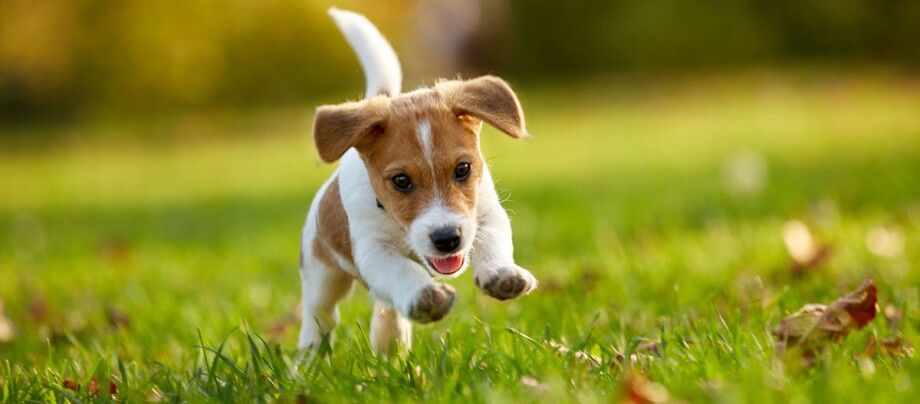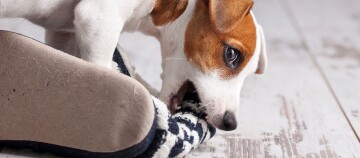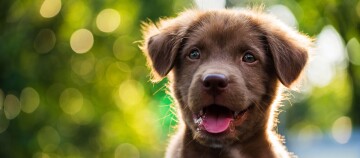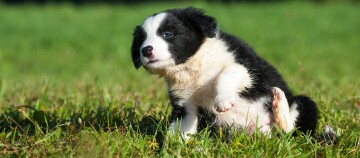Puppy Development Stages – from Puppy to Socialisation Phase
03.01.2023 - Reading time: 4 minutes

All puppies go through certain stages of development before they reach maturity. In the first 14 weeks of life in particular, pups go through a series of fascinating changes that hone and shape their social and physical skills and shape their personality. The puppy period usually lasts one year and is also known as the socialisation phase. Learn more about the developmental stages your puppy will be going through and what you should keep in mind during the socialisation phase.
The neonatal phase: the first two weeks after the birth of the puppy.
Newborn puppies come into the world helpless: they are blind, that is, their eyes are closed and their senses only partially developed. Their first two weeks of life revolve almost exclusively around feeding to promote their ongoing development. At this stage, puppies can smell, taste and sense touch, especially body heat. This is important because it allows them to find their mother’s teats. As they are not yet able to support their own weight, they crawl towards the teat in paddle-like fashion. In the process, they slowly begin to gain coordination and strengthen their muscles.
Puppies spend almost 90% of their first two weeks asleep, and when they are not sleeping, they are feeding. The maternal milk, especially the first form produced immediately after delivery which is also known as the ‘colostrum’ contains all the nutrients, antibodies and energy the pups need. It protects them from infections during the first weeks of life and also allows them to gain a huge mount of weight, in fact, puppies double their body weight in the first week alone.
Puppy development: the transition phase
The transition phase in puppy development is the period from the second to the fourth week of life. During these two weeks, the puppies’ eyes open, their sense of hearing develops and their sense of smell becomes sharper, so that they become increasingly aware of their environment. Whereas they previously relied on maternal stimulation to defecate and urinate, they now begin to do so on their own. The body’s thermoregulation system is now functional, meaning that the pups are no longer dependent on their mother’s and litter mates’ body heat.
Puppies begin to walk at around 21 days of life, slowly gaining more independence and gingerly exploring the world. They also begin to show social interaction with their siblings. As the pups can now defecate and urinate on their own, this is a good time to take the first small steps in house-training. To do so, breeders may place small boxes with an organic underlayer in a suitable area or let the animals go outside to a restricted area to do their business.
The socialisation phase: an important step in puppy development.
The socialisation phase, which has a major impact on puppy development, begins after the fourth week. It can last up to 14 weeks depending on the breed and this is when the animal’s character is formed. What puppies learn during this period stays with them for life, which is why it is important to make the most of it and expose them to the widest possible range of positive experiences: between three and five weeks of life especially and up to the age of eight weeks, puppies experience other animals, new people, noises, objects and external stimuli without fear. The more they get to discover in a controlled manner during that time, the more relaxed and confident they will be in the future. This is due to the part of the nervous system that regulates relaxation and stress. What puppies are exposed to in stress-free conditions now, they will continue to experience in a calm manner later in life. This process is very important to generate a sense of confidence and security that will make the dog feel safe in different situations.
The fearless stage of puppy development, which lasts up to the eighth week, is followed by about two weeks during which puppies become more cautious and fearful. This is a natural process that protects them from future dangers. It is therefore important to make sure that new experiences are introduced gently and avoiding overstimulation, as negative impacts are difficult to override. Since social play does not really start until puppies are eight weeks old, it is generally best to leave them with their litter mates and mother for a little while longer.


